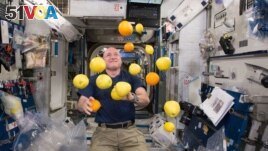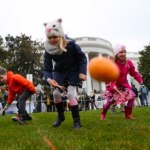04 April 2021
A new study suggests that long periods in space can cause the human heart to shrink.
The study -- by a team of American researchers -- comes as the U.S. makes plans to build a long-term base on the moon and prepares to send astronauts to Mars.
Part of the study was based on the experiences of retired astronaut Scott Kelly. The U.S. space agency NASA says that during his career, Kelly spent more time in space than any other American astronaut. One of Kelly's stays aboard the International Space Station (ISS) lasted 340 days.
Researchers from the University of Texas' Southwestern Medical Center (UT Southwestern) in Dallas examined physical data collected during Scott's long stay aboard the ISS. The goal was to learn the effects of weightlessness on heart health and performance.
The team found that during Kelly's stay in space, the left ventricle of his heart shrank about 0.74 grams per week.

Scott Kelly with lemons in space. Researchers studied how diet affected his microbiome as part of NASA's Twins Study.
Dr. Benjamin Levine is a professor of internal medicine at UT Southwestern. He was the leader of the research. In a statement, he explained that because of the conditions in space, the heart does not have to work as hard to pump blood uphill from the feet. Over time, this can cause shrinkage.
The heart has to work harder to keep blood flowing as it works against gravity, Levine explained. This permits the heart to keep its size and perform effectively. In an effort to keep their muscles and organs healthy in space, astronauts are required to perform different kinds of exercises throughout their stay.
Reductions in heart size are also seen in patients who spend long periods in bed because they are lying flat and the heart does not have to work as hard to pump. In the astronaut experience, Levine said that even though the heart is good at adapting to changes in gravity, the exercise Kelly got was not enough to keep the heart unchanged.
"Both the impact of gravity as well as the adaptive response to exercise play a role," he told the American Heart Association's (AHA) Circulation Journal Report. "And we were surprised that even extremely long periods of low-intensity exercise did not keep the heart muscle from shrinking," Levine added.
Full results of the study recently appeared in the AHA's publication Circulation.
A second part of the study examined data from a long-distance swimmer who spent nearly a year trying to cross the Pacific Ocean. The swimmer, Benoit Lecomte, was chosen because he swam more than 2,800 kilometers over 159 days. Lecomte made it about a third of the way across the Pacific before deciding to stop because of bad weather and damage to a boat following him.
Levine says long-distance swimming has similar effects to weightlessness because water pressure works against the force of gravity. The study showed that during Lecomte's swim, his left heart ventricle shrank about 0.72 grams per week.
The researchers noted that both Kelly and Lecomte had nearly the same heart shrinkage level even though Lecomte exercised much more, swimming an average of six hours a day. Kelly spent one to two hours a day exercising in space.
Levine said he was somewhat surprised by this finding. But he noted that endurance swimming is not considered a "high-intensity" exercise. So the health benefits from swimming were likely outweighed by the heart not having to work as hard to pump blood uphill.
Even with the changes in both men, Levine said the overall heart function "remained good" throughout the study period. "I think this is encouraging for long-duration space flight," he added. "It shows that even after a year in space, the heart adapts relatively well."
The researchers say further study will be needed to confirm the latest findings as scientists attempt to create guidelines for future astronauts expected to spend long periods in space.
Levine is prepared to lead some of those studies. He has worked with NASA on several projects in the past and the space agency recently awarded him $3.8 million to be used over the coming years to study the effects of space travel on the heart.
I'm Bryan Lynn.
Bryan Lynn wrote this story for Learning English, based on reports from UT Southwestern, the American Heart Association and Circulation. Hai Do was the editor.
We want to hear from you. Write to us in the Comments section, and visit 51VOA.COM.
___
Words in This Story
ventricle – n. either of two small, hollow spaces on each side of the heart that force blood into tubes leading from the heart to other parts of the body
adapt – v. to change to become suitable for a new situation
impact – n. a powerful or major influence or effect
respond – v. to answer or reply
benefit – n. a helpful or good effect
function – n. the natural purpose of something
encourage – v. to make (someone) more determined, hopeful, or confident













